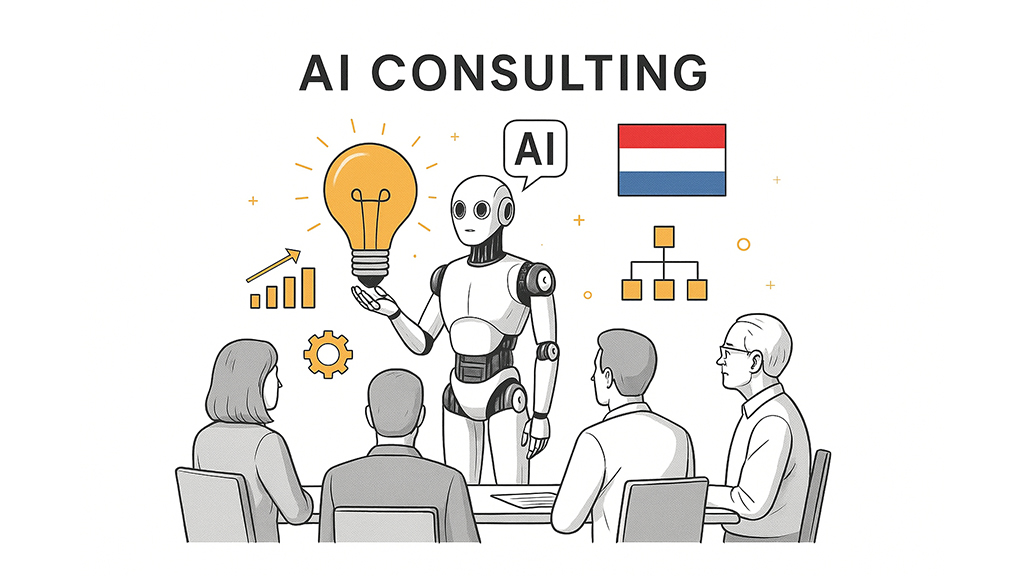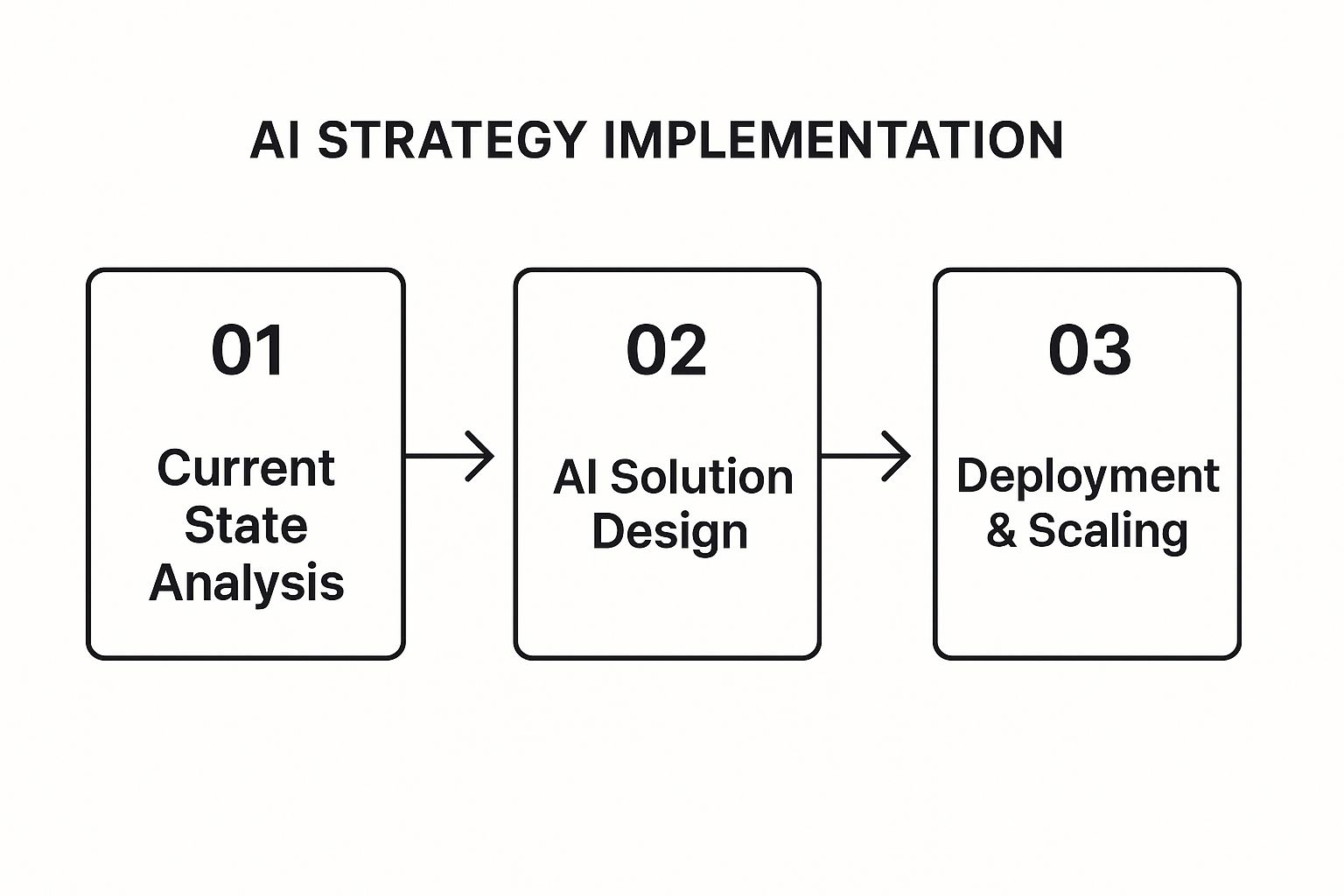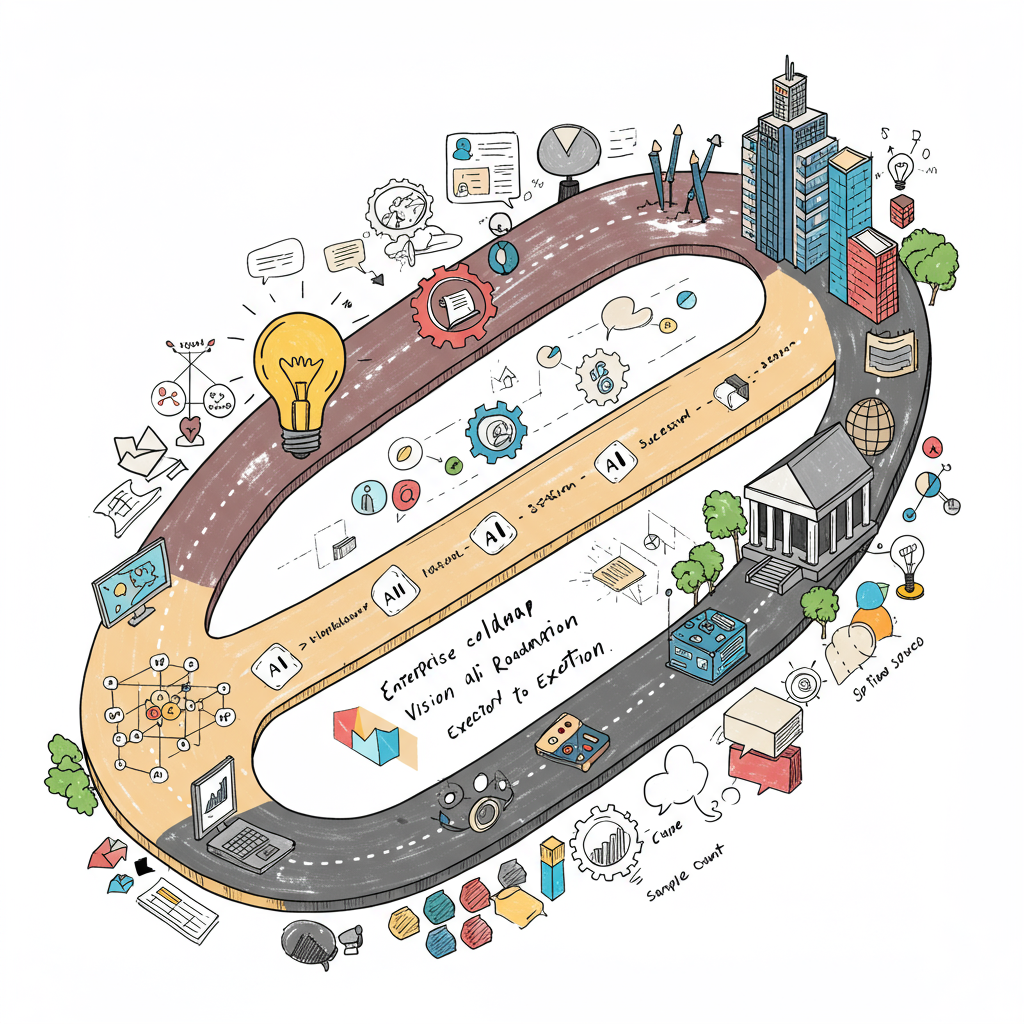AI Strategy Consulting Guide: Transform Your Dutch Business
Discover expert ai strategy consulting services in the Netherlands. Battle-tested approaches for business transformation that deliver results.

Understanding What AI Strategy Consulting Really Means
The term "AI" is frequently discussed, but its practical application in business strategy often remains unclear. AI strategy consulting, specifically within the NL region, focuses on leveraging AI to address tangible business challenges. This involves improving efficiency and driving growth, moving beyond simply adopting the latest technology. It requires a deep understanding of your specific business needs and the nuances of the Dutch market.
Beyond the Buzzwords: Defining AI Strategy
AI strategy consulting involves creating a comprehensive plan for integrating AI into your business operations. This extends beyond implementing isolated AI tools like chatbots or automating individual tasks. A robust AI strategy considers the broader context of your business.
This includes analyzing existing processes, identifying areas where AI can deliver value, and developing a roadmap for implementation. It also encompasses critical areas like data management, talent acquisition, and ethical considerations.
Key Differences: AI Strategy vs. Traditional IT Consulting
To understand the distinction, let's compare AI strategy consulting with traditional IT consulting. The table below highlights key differences between these two approaches.
Aspect
Traditional IT Consulting
AI Strategy Consulting
Focus
Technology implementation & maintenance
Business transformation through AI
Goal
Improve system efficiency
Achieve strategic business objectives
Approach
Project-based
Holistic & continuous
Deliverables
Working systems & infrastructure
AI-powered solutions & business value
Traditional IT consulting primarily focuses on implementing and maintaining technology systems, while AI strategy consulting aims to transform the business using AI. This represents a shift from project-based solutions to a more holistic and continuous approach. If you are unsure about how to uncover the right AI opportunities in your business, check out this robust AI strategy consulting tool here.
Why AI Strategy Matters in the Netherlands
The Netherlands presents a significant opportunity for AI adoption. The AI market in the Netherlands is expected to reach US$2.38 billion by 2025. This growth is especially evident in sectors like customer service and IT. Find more detailed statistics here This demonstrates the growing importance of incorporating AI into business strategies within the NL region. However, realizing this potential requires a clearly defined AI strategy.
From Tools to Transformation: Building AI Capabilities
Simply purchasing AI tools is insufficient for true business transformation. Real change comes from developing internal AI capabilities. This means cultivating the necessary skills and expertise to manage and optimize AI solutions effectively over time.
It also involves fostering a culture of innovation and experimentation within the organization. A successful AI strategy ultimately depends not just on technology, but also on people, processes, and a long-term commitment to growth. This approach empowers your business to thrive in an increasingly competitive environment. Understanding AI strategy consulting allows you to choose the best approach for your business in the NL region.
Navigating The Dutch AI Regulatory Landscape

For businesses operating in the Netherlands, understanding the evolving AI regulatory environment is essential for sustained success. This goes beyond simply adhering to rules and regulations. It requires strategically integrating compliance into your overall AI strategy. This proactive approach can transform potential regulatory hurdles into opportunities for gaining a competitive edge.
The EU AI Act and Its Impact on Dutch Businesses
The EU AI Act, in effect from August 2024, introduces a risk-based framework for AI systems. This framework categorizes AI systems into different risk levels, each with its own set of requirements. This new legislation will significantly impact how companies in the Netherlands develop and deploy AI. The increasing adoption of AI in the Netherlands is occurring alongside these significant regulatory developments. The EU AI Act introduces this risk-based approach, banning certain harmful AI applications and imposing strict obligations on high-risk AI. Learn more about these trends and developments. This underscores the importance of AI strategy consulting for navigating this complex and ever-changing regulatory landscape.
Understanding AI Risk Classifications
The EU AI Act classifies AI systems based on their potential impact. These categories range from minimal risk, such as spam filters, to unacceptable risk, such as social scoring systems, which are prohibited. Understanding where your AI systems fall within this framework is the first step toward ensuring compliance.
The Role of the Dutch Data Protection Authority
The Dutch Data Protection Authority (Autoriteit Persoonsgegevens) plays a vital role in enforcing AI regulations. They offer guidance and ensure organizations adhere to data protection laws when utilizing AI. Keeping up-to-date with their latest guidelines and pronouncements is critical for maintaining compliance.
Preparing for Compliance Deadlines
Preparing for the EU AI Act and other relevant regulations requires proactive planning. This includes conducting AI risk assessments, establishing robust governance structures, and meticulously documenting compliance efforts. Consulting with AI strategy experts can assist in developing and implementing a comprehensive compliance strategy that meets all regulatory requirements.
Turning Compliance into a Competitive Advantage
Successfully navigating AI regulations positions your business advantageously in the Dutch market. Demonstrating a commitment to ethical AI practices and data privacy builds trust with both customers and stakeholders. This trust translates into a stronger brand reputation and a distinct competitive edge.
Practical Frameworks for AI Risk Assessment
Implementing a practical framework for AI risk assessment is essential. This involves identifying potential risks, evaluating their likelihood and potential impact, and developing effective mitigation strategies. This structured approach allows for effectively managing AI-related risks.
Building Effective AI Governance Structures
Establishing robust governance structures is equally important. This includes clearly defining roles and responsibilities, implementing effective oversight mechanisms, and ensuring accountability for AI-related decisions. Strong governance ensures AI initiatives align with ethical principles and regulatory requirements. This builds a sustainable and responsible AI strategy adaptable to the evolving Dutch legal environment. Ultimately, sound AI governance fosters trust and strengthens your market position. Through appropriate AI strategy consulting, Dutch companies can effectively navigate this changing landscape and fully realize the potential of AI.
Industry-Specific AI Strategies That Actually Work

Generic AI solutions rarely deliver the best results. Businesses in the Netherlands looking to truly transform their operations need industry-specific AI strategies. This means understanding that the ideal approach for a logistics company is very different from the approach needed by a healthcare provider.
This targeted approach is changing the AI consulting landscape in the Netherlands. Industry-specific expertise is becoming increasingly important. By 2025, companies are predicted to prioritize tailored AI solutions. These will be for sectors like logistics, agriculture, energy, and healthcare, rather than opting for generalized services. Explore this topic further This shows a growing understanding of the need for specialized AI approaches that address the unique challenges of each industry.
Logistics: Optimizing the Supply Chain
The logistics sector in the Netherlands can significantly benefit from AI. AI has the potential to optimize delivery routes, predict possible disruptions, and automate warehouse operations.
Real-time tracking powered by AI, for example, can boost efficiency and lead to faster delivery times. These advantages contribute to a stronger, more responsive supply chain.
Agriculture: Precision Farming with AI
AI offers valuable tools for precision farming. Using data analysis and predictive modeling, AI can optimize irrigation, fertilization, and pest control.
This leads to higher yields, lower resource consumption, and a smaller environmental impact, ultimately creating a more sustainable and efficient agricultural sector.
Energy: Smart Grids and Predictive Maintenance
The energy sector faces distinct challenges that AI can help solve. AI can optimize energy consumption, predict equipment failures, and improve grid stability.
Predictive maintenance, powered by AI, enables proactive repairs. This minimizes downtime and maximizes efficiency, contributing to a more robust and sustainable energy infrastructure.
Healthcare: Personalized Medicine and Diagnostics
AI's potential in healthcare is substantial. AI-powered diagnostic tools can improve both accuracy and speed. Personalized medicine approaches, driven by AI algorithms, can lead to better treatment outcomes.
These advancements contribute to a more advanced and patient-focused healthcare system.
Financial Services: Fraud Detection and Risk Management
Financial institutions are increasingly using AI. AI algorithms can detect fraudulent transactions, assess credit risks, and automate customer service.
This leads to a more secure and efficient financial system, which benefits both institutions and their customers.
Identifying the Right AI Applications for Your Business
Success with AI depends on finding the right applications for your particular industry and business model. AI strategy consulting helps businesses understand which AI solutions provide the best return on investment. It also helps them learn how to best integrate AI into their existing operations.
Furthermore, consulting addresses the crucial elements of data management, talent acquisition, and change management, which are essential for successful AI implementation. This focused approach ensures that businesses develop AI capabilities that create sustainable growth and a competitive advantage.
Building Your AI Strategy: Proven Implementation Framework
A successful AI strategy requires more than just selecting the right technology. It involves a structured approach to implementation. This proven framework helps businesses, including successful Dutch companies, translate the potential of AI into tangible results.

The framework emphasizes a structured, three-step process: Current State Analysis, AI Solution Design, and Deployment & Scaling. This phased approach ensures AI initiatives align strategically and are implemented effectively.
Current State Analysis: Understanding Your Starting Point
The first step, Current State Analysis, assesses your organization's AI readiness. This involves evaluating existing data infrastructure, available skill sets, and potential AI opportunities within your business processes. Understanding your data quality, team skills, and potential adoption bottlenecks establishes a clear baseline for future decisions.
AI Solution Design: Crafting the Right Approach
Next, AI Solution Design transforms identified opportunities into actionable solutions. This phase defines specific use cases, selects appropriate technologies, and designs AI integration into workflows. Choosing the right AI tools and tailoring them to your needs is key. Ethical and regulatory compliance is also addressed, ensuring responsible AI practices. Careful planning in this phase ensures solutions align with your overall business goals.
Deployment & Scaling: Realizing Value and Expanding Impact
Finally, Deployment & Scaling focuses on implementing and expanding AI solutions. This encompasses pilot projects, change management initiatives, and ongoing performance monitoring. Starting with a small pilot project before organization-wide implementation is a common approach. Consistent monitoring and evaluation ensure continuous improvement and maximize the value of AI investments. This measured approach mitigates risks and allows for ongoing optimization.
To further illustrate these phases, consider the following table:
AI Strategy Development Phases: Key phases, deliverables, and typical timelines for comprehensive AI strategy development
Phase
Key Activities
Deliverables
Timeline
Current State Analysis
Assessment of AI readiness, data infrastructure evaluation, skills gap analysis, opportunity identification
AI readiness report, Gap analysis report, Opportunity map
2-4 weeks
AI Solution Design
Use case definition, technology selection, workflow integration design, ethical and regulatory assessment
Solution design document, Technology roadmap, Integration plan
4-8 weeks
Deployment & Scaling
Pilot project implementation, change management, performance monitoring, solution expansion
Pilot project results, Implementation report, Performance metrics
Ongoing
This table summarizes the key activities, deliverables, and typical timelines for each phase. Note that these timelines can vary depending on the specific project and organization. Understanding these phases is crucial for a successful AI journey.
Critical Success Factors for AI Strategy Implementation
Several factors are essential for successful AI strategy implementation:
- Stakeholder Alignment: Ensure all stakeholders understand and support the AI strategy.
- Realistic Timelines: Develop timelines that account for the complexity of AI implementation.
- Governance Structures: Establish clear governance to oversee AI projects and manage risks.
These elements ensure long-term sustainability and maximize the benefits of AI adoption.
Avoiding Common Pitfalls
AI strategy consulting helps businesses avoid common pitfalls:
- Focusing on technology over business value: AI initiatives must align with strategic business goals.
- Ignoring data quality issues: Addressing data quality challenges early on is crucial.
- Underestimating change management: Prepare for the cultural and operational shifts AI brings.
Addressing these issues proactively increases the likelihood of AI success. Working with experienced AI strategy consulting partners, such as Ekipa AI, provides valuable guidance. They can help develop and implement a comprehensive AI strategy tailored to achieve your business objectives.
Choosing AI Strategy Consulting Partners Who Deliver
Finding the right AI strategy consulting partner is essential for success in the competitive Dutch market. Not all consultants offer the same level of expertise. This section explains how to distinguish exceptional AI strategy consultants from those offering repackaged technology services.
Key Criteria for Selecting an AI Strategy Consultant
Selecting the right consultant requires careful evaluation. Here are the key criteria to consider:
- Deep AI Expertise: Look beyond general technology consulting. Find consultants with a demonstrable history of success in developing and implementing AI strategies.
- Industry-Specific Knowledge: Consultants should possess a deep understanding of your specific industry within the Netherlands. This enables them to create solutions tailored to your particular challenges and opportunities.
- Data Strategy Focus: Data forms the basis of AI. Your chosen consultant should have robust data management and analytics skills.
- Change Management Expertise: AI implementation involves substantial organizational change. Consultants should grasp change management principles and be capable of guiding your team through this process.
- Cultural Fit: A strong working relationship is essential. Choose a partner whose values and communication style complement your organization's culture.
Questions to Reveal True Strategic Capability
Don't be fooled by flashy presentations. Ask insightful questions to gauge a consultant's true abilities.
- Can you share specific examples of successful AI strategy implementations in the Netherlands, similar to my business? This helps assess relevant experience.
- How do you address data quality issues in AI projects? This evaluates their data strategy proficiency.
- What is your change management process for AI implementations? This examines their ability to manage organizational change.
- How do you measure the success of AI initiatives? This investigates their understanding of key metrics and ROI.
- Can you outline your approach to risk management in AI projects, especially regarding the EU AI Act? This explores their understanding of the Dutch regulatory landscape.
Red Flags to Watch Out For
Be cautious of consultants displaying these warning signs:
- Overemphasis on Technology: True AI strategy consultants prioritize business value over specific technologies.
- Lack of Industry Experience: Generic solutions rarely yield optimal results in the Dutch market.
- Ignoring Data Challenges: AI success hinges on high-quality data.
- Poor Communication: Open and proactive communication is paramount for a successful partnership.
Pricing Models and What They Mean
Understanding pricing structures is critical. Consultants may employ various models:
- Project-Based Pricing: A fixed price for a defined scope of work.
- Time and Materials: Hourly rates for consultants' time and expenses.
- Value-Based Pricing: Fees tied to the achieved business outcomes.
The best model depends on your project's specific needs and risk tolerance.
Evaluating Cultural Fit
Long-term success depends on more than technical skills. Consider the following:
- Communication Style: Do they communicate clearly and proactively?
- Values Alignment: Do their values match your organization's ethics and principles?
- Team Dynamics: Will their team collaborate effectively with yours?
A positive working relationship is crucial for achieving significant results. This focus on selecting the right partner reflects the growing emphasis on specialized, industry-focused strategies in the AI consulting market. Companies that engage specialized AI strategy consultants see significantly higher success rates—73% higher—in their AI projects than those using general technology consultants. They also achieve 2.4 times the return on investment. Read the full research here. This underscores the importance of choosing a consultant who understands the unique challenges and opportunities within your specific industry. Selecting the right partner can transform your AI journey from a potential risk into a source of lasting competitive advantage in the Netherlands.
Measuring AI Success: Metrics That Actually Matter
Successfully integrating AI into your Dutch business requires a robust evaluation system. It's about more than just launching the technology; it's about demonstrating a tangible return on investment. This means looking beyond superficial metrics and delving into the true value AI brings. Understanding both quantitative and qualitative indicators is crucial for accurately reflecting AI's impact.
Establishing Baseline Measurements: The Foundation For Success
Before implementing any AI solution, establish clear baseline measurements. This involves collecting data on key performance indicators (KPIs) relevant to your objectives. For instance, if your goal is to reduce customer service response times, track the current average before introducing AI-powered chatbots. This pre-implementation data serves as a benchmark against which you can measure the success of your AI initiatives. This process is essential for showcasing the value of your AI investments.
Quantitative Metrics: Measuring The Tangible Impact
Quantitative metrics provide concrete evidence of AI's effectiveness. These metrics offer tangible proof of AI's influence, allowing stakeholders to see its direct impact on business goals.
- Cost Reduction: Measure how much money AI saves your business through automation, optimization, or reduced resource consumption.
- Revenue Growth: Quantify how AI contributes to increased revenue through improved sales conversions, personalized marketing, or new product development.
- Efficiency Improvements: Track how AI accelerates processes, leading to reductions in processing times, improvements in throughput, or increased productivity.
- Customer Satisfaction: Measure improvements in customer experience using metrics like Net Promoter Score (NPS) or customer satisfaction surveys to reveal the positive impact of AI on customer interactions and loyalty.
These quantifiable results help justify continued investment in AI, demonstrating its positive effect on your bottom line.
Qualitative Metrics: Capturing The Intangible Benefits
While numbers are essential, qualitative metrics are equally vital for grasping the full impact of AI. These less tangible benefits often play a significant role in long-term success. They offer a more nuanced perspective on how AI influences the overall business environment.
- Improved Decision-Making: Assess how AI empowers better decisions through improved data analysis and insights, leading to more informed strategic choices.
- Increased Innovation: Evaluate how AI fosters a culture of experimentation and the development of new ideas, potentially leading to new products, processes, or business models.
- Enhanced Employee Engagement: Measure how AI transforms the work experience for employees, such as automating tedious tasks, freeing up time for strategic work, and creating opportunities for skill development.
These qualitative improvements contribute significantly to your organization's overall health and long-term prospects.
Avoiding Measurement Pitfalls: Ensuring Accurate Insights
When measuring AI success, avoid these common mistakes:
- Focusing on Vanity Metrics: Steer clear of metrics that appear impressive but don't correlate with real business value, such as social media likes that don't translate into sales.
- Ignoring the Long-Term: AI's true value often unfolds over time. Avoid a short-sighted focus on immediate gains, and instead, look at the broader picture of long-term transformation.
- Lack of Transparency: Maintain a transparent and easily understood measurement process for all stakeholders to foster trust and informed decision-making.
Building Effective Performance Dashboards: Visualizing Success
Create performance dashboards that visually represent key AI metrics. This allows for easy progress tracking, trend identification, and results communication to stakeholders. Visualizing data facilitates quick identification of areas needing adjustment and effectively demonstrates the value of AI investments.
Continuous Improvement: Refining Your AI Strategy
AI strategy isn't static. It requires continuous monitoring, evaluation, and refinement. Use insights from your performance measurements to optimize AI solutions, adjust your strategy, and ensure ongoing success, maximizing your return on investment.
Are you ready to unlock the potential of AI in your Dutch business? Consult a team of next-gen AI strategy consultants to discover and implement AI solutions rapidly. From use case discovery and AI chat consulting to expert refinement and end-to-end tech execution, we turn ideas into scalable impact.



